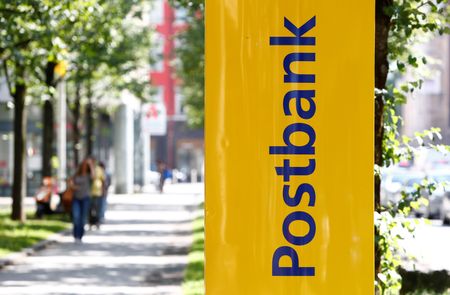 1
1 1
1

FRANKFURT (Reuters) -A pay increase for thousands of workers at Deutsche Bank’s retail unit Postbank has been agreed with management, brightening prospects for a wage deal for the broader German industry after months of wrangling and strikes.
The deal, sealed on Tuesday evening, comes as inflation in Germany hovers above 5% and after Deutsche paid its chief executive officer 20% more in 2021 to reward him for the bank’s most profitable year in a decade.
Under the deal’s terms, workers get a 3.1% pay increase from June 1 and a further increase of 2.1% from February 2023, the Verdi union and Deutsche Bank said. The deal also includes 750-euro ($826) payments in May and January.
The union had asked for a 6% wage increase and other benefits.
“Negotiations took place in an atmosphere of great uncertainty due to the environment of ultra-low interest rates, increasing inflation, and a dramatic geopolitical crisis in Europe,” said Michael Ilgner, head of personnel at Deutsche Bank.
Workers went on a strike on Friday, the latest volley in the pay negotiations ahead of Tuesday’s third round of talks.
Attention now turns to wage talks for 60,000 workers at Germany’s public-sector banks and 140,000 workers at private banks.
Those workers have been seeking a 4.5% pay increase, as well as other rights such as working outside the office. That wage dispute has been going since last year.
High inflation has strengthened the hand of union officials, but banks have faced stiff competition and low profits, which has resulted in efforts to cut costs and reduce headcount.
Germany has more banks per capita than most of its neighbours and other industrialised economies.
($1 = 0.9081 euros)
(Reporting by Frank Siebelt and Tom SimsEditing by Miranda Murray and Mark Potter)